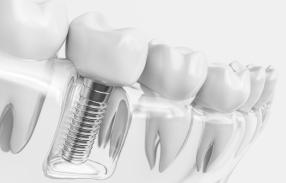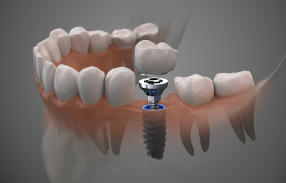Dental Implants – Fountain Valley, CA
A Complete Solution for Tooth Loss
Dental implants are widely considered by many patients and dentists to be the ideal solution for tooth loss. It isn’t just that they look and feel like natural teeth; thanks to the fact that dental implants can mimic tooth roots, they offer many benefits that traditional dental bridges and dentures simply don’t have an answer for. Are you interested in getting dental implants in Fountain Valley? You can start the process right now by giving Elite Dental of Fountain Valley a call.

Why Choose Elite Dental of Fountain Valley for Dental Implants?
- In-House Dental Implant Surgery
- Dental Bone Grafts and Sinus Lifts Available
- Cutting-Edge Dental Technology
What Are Dental Implants?

A traditional tooth replacement only recreates the part of the tooth that can normally be seen above the gumline. Dental implants are different in that they also mimic the root structures of the teeth. A dental implant can be divided into three parts: a post, a restoration, and the abutment. The post goes in the jaw and is what will be used to keep the new tooth or teeth in place. The restoration can be adental crown, bridge, or denture that mimics the natural teeth. The abutment is what keeps the other two parts connected.
The 4-Step Dental Implant Process

Compared to traditional restorations like dental bridges and dentures, dental implants involve a more extensive process for ensuring successful treatment. Not only can it take several months to complete, but you’ll also expect more pieces to come into play when rebuilding your smile. Fortunately, our practice can perform the entire process in-office, meaning you won’t have to travel far to visit a team you already know and trust. Before starting your treatment, here are the four main phases of the dental implant process.
Initial Dental Implant Consultation

The first step is to examine your mouth, determine how many teeth have been lost, and decide whether or not you can get dental implants. You’ll come into the office for an initial consultation, where our team will evaluate your oral health and determine the proper steps for rebuilding your missing teeth. We’ll also walk you through the entire process as well as the cost of the treatment and your financial options.
If you have oral health issues, such as decay, gum disease, or an infection, then preliminary services might be needed before moving forth with your procedure. These can include gum disease treatment, bone grafting, or even tooth extractions, if necessary.
Dental Implant Surgery

Our team has been trained to place dental implants. This means we can perform the surgery right here without referring you to an outside specialist. To begin, we’ll completely numb your mouth so that you are entirely pain-free throughout your appointment. We’ll then make small incisions in your gum to access the jawbone location where we’ll strategically place your implants. Once in place, we’ll suture the gums closed around them and top them off with a protective dental cap to keep them safe while you heal for the next few months.
Dental Implant Osseointegration & Abutment

Depending on how many implant posts you get, it can take 3 to 6 months for them to integrate with the jawbone. This process is known as osseointegration, which is what creates the lifelike stability needed for your new restorations to feel and function like natural pearly whites. After completely healing, you’ll return to us to receive your abutments—the tiny metal connector pieces that will link your restorations to your implants.
Delivery of Dental Implant Restoration(s)

The fourth and final step is to design a restoration to be placed on your implant posts. Great care will be taken so that your new teeth look and feel like your original teeth as much as possible. After your gums have recovered from getting your abutments, you’ll come back to our office so we can place your new crown, dental bridge, or denture. Once we’ve confirmed that your bite is correct and that you’re comfortable with your smile, you’ll be free to show off and make the most of your dazzling results.
Benefits of Dental Implants

- A dental implant can provide roughly 80% of the original biting force of your natural teeth, which is enough to let you eat virtually anything you want.
- Dental implants fight against bone loss, keeping the jawbone stimulated so that it doesn’t break down over time.
- A fully integrated dental implant stays firmly in place at all times, so your new teeth won’t slip.
- Dental implants have a longer lifespan than other restorations. In fact, they can last the rest of your life.
Who Dental Implants Can Help

Even if dental implants offer one of the most comprehensive and effective ways of rebuilding missing teeth, you’ll still need to undergo an initial consultation to see if you’re eligible for the treatment. Our team will conduct a thorough evaluation of your oral health and smile to determine if you’re a good candidate before moving forward. Even if you aren’t, this doesn’t mean we won’t be able to help get you there. Here’s what you should know about what makes someone a good candidate for dental implants as well as the different ways this treatment can address tooth loss.
Who Is a Good Candidate for Dental Implants?

In many cases, you can be eligible for dental implants as long as you have:
Healthy gums: Being free of disease or infection in the gums and connective tissues will help ensure the success of dental implants in the long run.
- Good overall health: You must be adequately healthy to undergo minor surgery as well as recover afterward.
- A strong jawbone: Having sufficient jawbone volume or density will provide a more stable foundation to support your dental implant(s).
Being able to commit to a process that will likely take several months will also be crucial for treatment success, which involves brushing, flossing, and rinsing with mouthwash every day as well as visiting your dentist for routine checkups and cleanings. Our team will discuss whether you’re a dental implant candidate at your initial consultation. If you are, we may recommend one of the following dental implant procedures based on the number of missing teeth.
Missing One Tooth

The process of replacing a single missing tooth with a dental implant is relatively simple. We just need to place one post in the place where the tooth used to be. Then we can design a dental crown that matches the rest of your smile and attach it to the dental implant post so that it can serve as your new tooth.
Missing Multiple Teeth

There are a few different ways to replace multiple teeth simultaneously with implants. One option is to attach a dental bridge to a pair of implants; this is useful for replacing three or more teeth in a row. For patients who have lost multiple nonconsecutive teeth, partial dentures attached to a custom number of implants may be the better option.
Missing All of Your Teeth

After losing all of your teeth, the first replacement option you’re likely to think of is dentures. However, instead of traditional removable dentures, you can have your new teeth attached to four to six dental implants so that they stay firmly anchored in your mouth while you’re eating or speaking.
Understanding the Cost of Dental Implants

Getting dental implants in Fountain Valley isn’t like buying a product from the store, where the sticker price is exactly the same for everyone. There are too many factors that can influence the cost to give a general estimate. Are additional preparatory procedures required before implant surgery? How many implants do you need? What kind will you have to get? All of these factors can affect the price of dental implants. At Elite Dental, we consider all these and more when we examine you at your consultation. Then we can give you a quote for your unique situation. Learn more about the cost of your dental implants by scheduling an appointment today!
Preliminary Treatments & Dental Implant Surgery
Prior to undergoing implant placement, many patients need to have certain work done, whether it’s gum disease therapy or a bone graft. These preliminary procedures will add to the overall cost. When it comes to the placement procedure itself, the cost can vary depending on the number of implants you are receiving. Fortunately, the number of implants is not necessarily the same as the number of teeth being replaced. In fact, you can replace an entire arch of teeth with as few as four implants!
The Parts of Your Dental Implant
As with many other products, the brand of your implants can determine the cost you pay. For example, although both are cars, a Honda Civic costs a comparable but different amount than a Toyota Corolla. Based on your needs and budget, we can find the products that will result in a fully restored, successful smile.
Dental Implants Are Worth the Investment
Looking only at the initial price of dental implants, they easily cost more than traditional dentures and bridges. However, unlike these older options, implants do not need to be replaced every five years or so. When you add up these costs over time, dental implants can become the smarter financial choice, potentially saving you hundreds of dollars while also sparing you the trouble of having to replace your teeth so often.
Does My Dental Insurance Cover Dental Implants?
Although there are some insurance policies that include implant benefits, insurance companies in general do not cover this replacement option. However, there could be parts of the process that are covered. For example, if you require gum disease therapy, the cost should be reduced because of insurance benefits. The restoration should also be partially covered by dental insurance, lowering your out-of-pocket expenses. After we’ve had a chance to examine your mouth, we’ll take a closer look at your policy to see where you can take advantage of your benefits.
Making Dental Implants Affordable
What if you don’t have dental insurance? Does this mean you can’t afford dental implants? We offer an alternative to dental insurance called the Elite Smile Club . In addition to essential preventive care, this plan comes with a 15 percent discount on most other treatments, including dental implants. During your consultation, we can also go over your financing and insurance options so that you can develop a strategy for saving as much money as possible.
Dental Implant FAQs
What causes dental implant failure?
Dental implants have an incredibly high success rate of 98% after five years of placement. However, it’s still important to be conscientious of your habits as your gums are healing and your implants are fusing with your jawbone, as this is commonly when dental implant failure occurs.
At your initial consultation, our team will discuss your habits and risk factors with you, helping you determine how you can move forward and maximize your treatment success. In some cases, this may mean quitting smoking leading up to and after your surgery. In others, it could mean being more diligent about your oral hygiene habits. Taking these steps will help ward off the threat of peri-implantitis, an infection that’s one of the most common causes of implant failure.
How long does it take to recover from dental implant surgery?
Dental implant surgery is relatively non-invasive. Although you may need to go under sedation in order to have your implants placed, the recovery period is relatively short. In fact, many patients are able to return to work within a day or two following their procedure. However, it’s important to keep in mind that everybody is different, meaning your healing process may not look like somebody else’s.
Follow our post-operative care directions closely, being sure to take any recommended or prescribed pain medications as directed. Within a few days, you should feel ready to continue on with your daily life. Just be sure to avoid strenuous exercise and activity for the first week and quit bad oral habits, like smoking and drinking, which could slow down the healing process.
Will people notice that I have dental implants?
Most likely, no! Dental implants are designed in every way to look exactly like your natural teeth. In fact, they’re so identical to home-grown teeth that you’ll likely forget that they aren’t!
Are there any foods I shouldn’t eat with dental implants?
One of the great benefits of dental implants is improved eating abilities. Because your restoration is attached to dental implants that are fused with your jawbone, you’ll be able to enjoy between 80 and 100% of your natural bite force. This will allow you to eat many, if not all, of the foods that you were able to eat with your natural teeth!
How long do dental implants last?
Dental implants are known for their longevity. Many studies have shown that they can last for up to 35 years, which is nearly four times as long as traditional restorations. This means you’ll have to endure fewer visits to your dentist in Fountain Valley as well as fewer dental bills.
